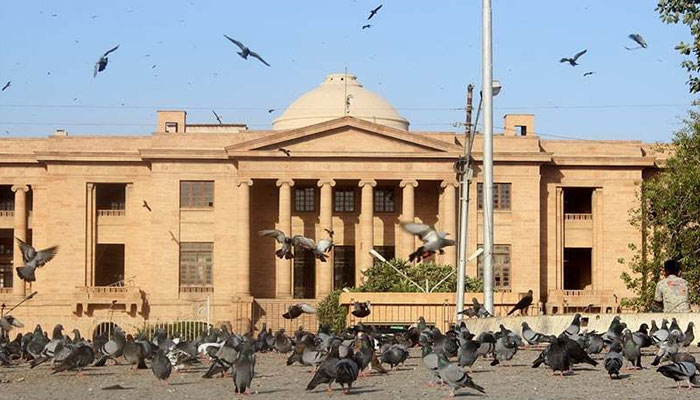Report sought from Sepa on petcoke’s handling at Karachi port
The Sindh High Court (SHC) on Thursday directed the Sindh Environmental Protection Agency (Sepa) to submit its inspection or survey report on petroleum coke’s handling at the Karachi port and its unsafe transportation in the city, causing a health and environmental hazard.
The order came on a petition of Dr Syed Raza Ali, on behalf of a non-governmental organisation, who had challenged petcoke’s handling at the Karachi port and its transportation in the city.
A Sepa representative told the SHC division bench headed by Justice Mohammad Ali Mazhar that they had conducted a survey on January 27 and its report was being compiled. The bench directed Sepa to file its inspection report, saying that if further inspection is required, the environmental watchdog may return to court with a comprehensive report on February 20.
In the January 15 hearing, Justice Mazhar had issued notices to the Karachi Port Trust (KPT), the Ministry of Ports & Shipping and Sepa, directing the provincial law officer to ensure the appearance of an official of the watchdog in court in the next hearing.
The petitioner had contended that despite the Supreme Court banning coal handling at the KPT, thousands of tonnes of it is still being handled, kept in open coal yard and transported in the city, causing a serious health and environmental hazard.
His counsel Salahuddin Ahmed submitted that the KPT is allowing the import of petroleum coke at the Karachi port without complying with the relevant environmental laws. He said that petcoke has the potential to cause harm to humans and the environment because it is not only inflammable but can also pose several direct and indirect risks to the health of people.
He added that petroleum coke particles cause serious and life-threatening respiratory diseases, as they enter human lungs through the air, and after penetrating them are very difficult to expel.
Citing the example of other countries, he said that the handling and storage of petroleum coke in the US, India and other countries is either banned or regulated through strict preventive measures.
The counsel submitted that petcoke can cause a range of health problems, including respiratory diseases, cardiovascular diseases and lung cancer, and most importantly, children are the most susceptible and are affected by the early onset of respiratory disease, which can prove fatal in the long term.
He submitted that petroleum coke is being transported through heavy vehicles to other cities from the KPT and that such vehicles pass through densely populated areas of Karachi, including Clifton, Boat Basin, DHA and Quaidabad.
He said that petcoke particles on berth and jetty flow into the water at the ports during washing or at the time of rain and cause marine pollution, which not only poisons the water but also destroys marine habitats.
He added that the SC had also banned coal handling at the KPT, but in essence it includes petroleum coke because its unloading and transportation from the port has the same ramifications as that of coal.
He told the court that if petcoke’s import is allowed in future, it should only happen through the Port Qasim, which at least has specialised facilities for the import of coal.
-
 Murder Suspect Kills Himself After Woman Found Dead In Missouri
Murder Suspect Kills Himself After Woman Found Dead In Missouri -
 Sarah Ferguson's Plea To Jeffrey Epstein Exposed In New Files
Sarah Ferguson's Plea To Jeffrey Epstein Exposed In New Files -
 Prince William Prepares For War Against Prince Harry: Nothing Is Off The Table Not Legal Ways Or His Influence
Prince William Prepares For War Against Prince Harry: Nothing Is Off The Table Not Legal Ways Or His Influence -
 'How To Get Away With Murder' Star Karla Souza Is Still Friends With THIS Costar
'How To Get Away With Murder' Star Karla Souza Is Still Friends With THIS Costar -
 Pal Reveals Prince William’s ‘disorienting’ Turmoil Over Kate’s Cancer: ‘You Saw In His Eyes & The Way He Held Himself’
Pal Reveals Prince William’s ‘disorienting’ Turmoil Over Kate’s Cancer: ‘You Saw In His Eyes & The Way He Held Himself’ -
 Poll Reveals Majority Of Americans' Views On Bad Bunny
Poll Reveals Majority Of Americans' Views On Bad Bunny -
 Wiz Khalifa Thanks Aimee Aguilar For 'supporting Though Worst' After Dad's Death
Wiz Khalifa Thanks Aimee Aguilar For 'supporting Though Worst' After Dad's Death -
 Man Convicted After DNA Links Him To 20-year-old Rape Case
Man Convicted After DNA Links Him To 20-year-old Rape Case -
 Royal Expert Shares Update In Kate Middleton's Relationship With Princess Eugenie, Beatrice
Royal Expert Shares Update In Kate Middleton's Relationship With Princess Eugenie, Beatrice -
 Andrew Mountbatten-Windsor’s Leaves King Charles With No Choice: ‘Its’ Not Business As Usual’
Andrew Mountbatten-Windsor’s Leaves King Charles With No Choice: ‘Its’ Not Business As Usual’ -
 Dua Lipa Wishes Her 'always And Forever' Callum Turner Happy Birthday
Dua Lipa Wishes Her 'always And Forever' Callum Turner Happy Birthday -
 Police Dressed As Money Heist, Captain America Raid Mobile Theft At Carnival
Police Dressed As Money Heist, Captain America Raid Mobile Theft At Carnival -
 Winter Olympics 2026: Top Contenders Poised To Win Gold In Women’s Figure Skating
Winter Olympics 2026: Top Contenders Poised To Win Gold In Women’s Figure Skating -
 Inside The Moment King Charles Put Prince William In His Place For Speaking Against Andrew
Inside The Moment King Charles Put Prince William In His Place For Speaking Against Andrew -
 Will AI Take Your Job After Graduation? Here’s What Research Really Says
Will AI Take Your Job After Graduation? Here’s What Research Really Says -
 California Cop Accused Of Using Bogus 911 Calls To Reach Ex-partner
California Cop Accused Of Using Bogus 911 Calls To Reach Ex-partner




